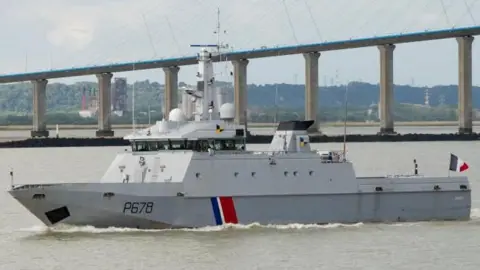In a recent incident that highlights ongoing tensions in post-Brexit relations between the UK and EU, French authorities have impounded a British fishing vessel accused of illegal fishing activities in their waters. The vessel, which was intercepted in the English Channel, is currently being held at the port of Boulogne while French officials deliberate over potential prosecution. This development marks a significant event in the ongoing discourse surrounding maritime laws and fishing rights after the UK’s departure from the EU.
The interception took place late Thursday night when the French Navy, specifically the patrol vessel Pluvier, conducted inspections and found the British fishing crew allegedly operating without the required license in French territorial waters. This incident not only raises concerns about fishing regulations but also serves as a flashpoint in the broader narrative of UK-EU relations, focusing on disputes over fishing rights that have been a contentious topic since Brexit took effect.
This seizure comes on the heels of criticism directed at UK Prime Minister Sir Keir Starmer by British fishermen regarding a recent fishing agreement with the EU, which purportedly grants EU fishing vessels continued access to UK waters for an additional 12 years. The deal has been seen by some as a betrayal of British fishing interests, stirring outrage among local fishing communities in the UK who feel that their access to fishing grounds is being compromised to favor foreign fleets.
In response to the incident, the UK’s Foreign Office has stated that they are providing support to a British national involved and are actively communicating with local authorities in France. The situation, however, remains delicate, as the Foreign Office emphasized its inability to comment further while the investigation by French fisheries authorities is ongoing. Critics within the UK, particularly from the Conservative Party, have accused the French government of double standards. They argue that while the French authorities have effectively acted against the British vessel for alleged violations, they have been criticized for their inability to effectively manage the increasing number of migrants attempting to cross the Channel.
The shadow home secretary, Chris Philp, expressed his discontent by pointing out the French government’s supposed inaction in preventing illegal immigration while swiftly dealing with the British fishing vessel. He pressed the notion that effective action should extend beyond fishing vessels to include managing and stopping illegal crossings that pose significant risks to individuals and maritime safety.
The context for this dispute is further complicated by the recent agreement struck between the UK and EU, which encompasses various fields including fishing rights, trade regulations, defense collaborations, and energy policies. Central to this new deal is the provision that allows European fishing vessels extended access to British waters in a bid to secure more favorable terms in other economic sectors. This component of the negotiation has received backlash from opposition parties in the UK, labeling the arrangement a form of capitulation to EU demands.
Despite differing opinions on the deal, certain parties such as the Liberal Democrats have recognized some positive strides in mending relationships with European counterparts. However, the overall sentiment among some factions remains that the government capitulated too easily, particularly in matters affecting domestic industries like fishing.
As discussions continue and tensions simmer, the international maritime laws and local fishing agreements will undoubtedly remain focal points in the relationship between the UK and France, especially as both countries navigate the complex landscape of post-Brexit adjustments and the ongoing challenges they present. The potential repercussions for the British fishing industry and the political landscape in the UK are likely to be significant as these debates progress.



